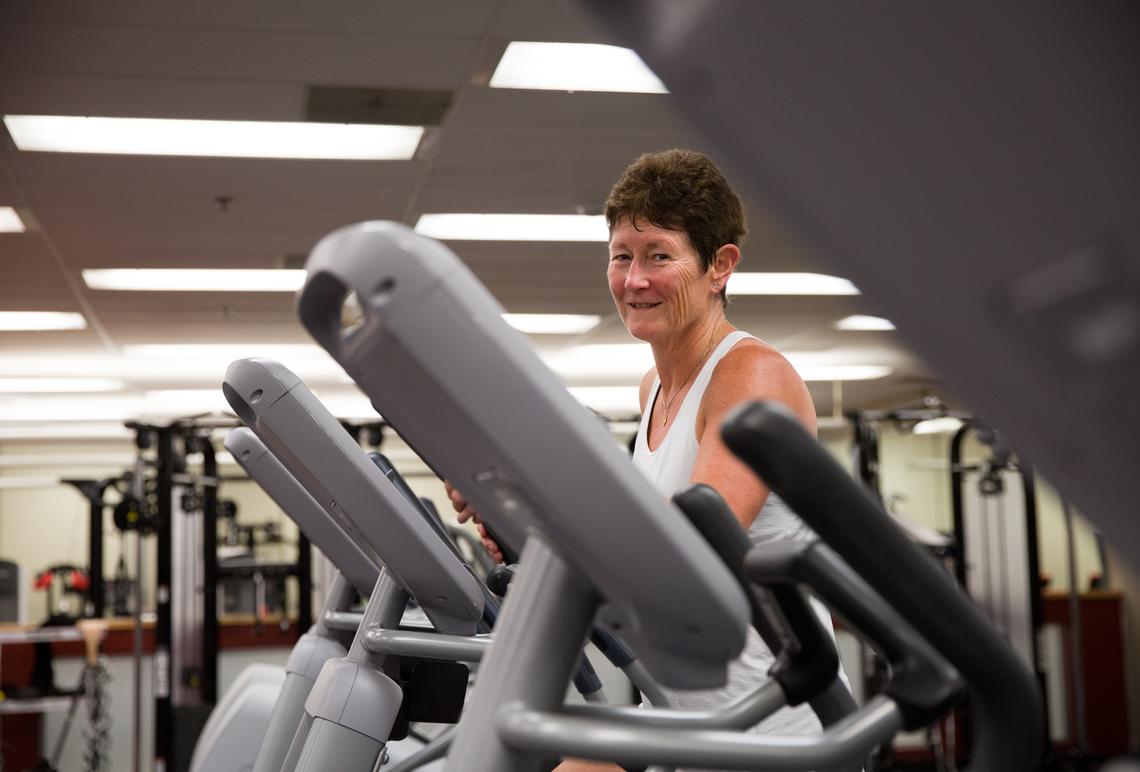May 13, 2021
Students passionate about preventing disease through physical activity

Kinesiology student Lexi Peart was “over the moon” when she learned she was accepted into the Master of Population Health program (MSc) in the U.K .at the prestigious University College London. The 22-year-old, who plays Dinos volleyball, is starting a new stage of her studies and she is passionate about it.
Peart says her interest in public health and the issues that plague our modern society, like non-communicable diseases, can all benefit from prevention through physical activity.
Peart completed an upper-level kinesiology course (KN433) that is framed around public health. Students often start the course with the perspective that public health is about hospitals and family physicians.

Lexi Peart, front, is entering the Master of Population Health program in the U.K. at the prestigious University College London.
David Moll
“But it is so much more than that,” Dr. Patricia Doyle-Baker, Dr. PH, PhD, a professor in the Faculty of Kinesiology and the course instructor, says. “Students become engaged in the course when they realize that information related to the population’s health shifts emphasis from individual-focused health behaviour to ones that encompass social and environmental influences of health.”
Why is population health so important?
Dr. Lindsay McLaren, PhD, president of Alberta Public Health Association and a professor in the Department of Community Health Sciences, states in a recent article that “It’s not just about your individual behaviour or the ability of your health-care system to treat your ailments, it’s about the root causes of good or bad health. Those root causes are hardwired into our social and economic systems, which are the product of political decisions.”
Still, it seems, many individuals would rather take a pill than get to the root cause. “Our health care is treatment- not prevention- focused. People aren’t as proactive as they could be. It takes a lot of motivation to live a healthy lifestyle,” says Gabriela Kuczynski, BSc‘20 (Kinesiology), who is another student also inspired by Doyle-Baker’s kinesiology course.
Proof positive
Kuczynski, 22, worked with cancer patients and cancer survivors in the Health and Wellness lab at the Faculty of Kinesiology under Dr. Nicole Culos-Reed, PhD. “It was great seeing how this population positively reacted to an exercise intervention,” says Kuczynski, who will start her master of public health (MPH) at Simon Fraser University in B.C. this fall.
Doyle-Baker says, “If anything, the pandemic has shown us that as individuals, we are vulnerable but as a community, when we collaborate, we can make a difference in the population’s health.”

Patricia Doyle-Baker teaches a course that is inspiring students to pursue further education in public health.
Riley Brandt, University of Calgary
It’s no wonder, then, that the enrolment of faculties with a health focus is increasing. “There will be a lot of cool careers in health promotion and prevention when this pandemic is over. I’m really looking forward to see how we can use what we have learned from this experience to improve the health of our society today and in future generations,” Kuczynski says.
For Doyle-Baker, she is proud of her students when they become reflective with their answers in class or they decide to pursue a degree in public health.
“I feel confident that we as an institute are contributing to global citizens,” she says knowing she will writing even more academic references for her students in the years to come.
Want to learn more about public health?
Register for Campus Alberta Annual Provincial Forum on Health Outcomes and Public Health, being held virtually Monday, May 17, 2021.The keynote speaker is Dr. Georges C. Benjamin, MD, and his topic is Hard Lessons Learned from COVID — The Way Forward for Public Health. He is the executive director of the American Public Health Association. More information and registration here.
Patricia Doyle-Baker is a professor in the Faculty of Kinesiology; School of Architecture, Planning and Landscape; and member of the O’Brien Institute for Public Health, at the University of Calgary.
Lindsay McLaren is a professor in the Department of Community Health Sciences in the Cumming School of Medicine (CSM) and member of the O’Brien Institute for Public Health at the CSM.
Nicole Culos-Reed is a professor in the Faculty of Kinesiology and adjunct professor in the Department of Oncology at the Cumming School of Medicine (CSM) and member of the O’Brien Institute for Public Health and the Arnie Charbonneau Cancer Institute at the CSM.
The Faculty of Kinesiology is ranked the No. 1 sport science school in North America and No. 11 globally according to the ShanghaiRanking’s Global Ranking of Sport Science Schools and Departments.



